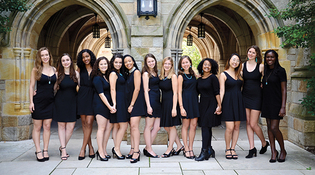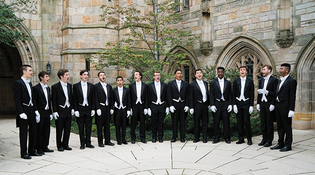 loading
loading
Light & VerityNew gender policy for singing groupsWhiffenpoofs, Whim ’n Rhythm auditions will be open to all.  Karen Yang ’18A cappella groups Whim ’n Rhythm (top) and the Whiffenpoofs (above) will work more closely together as part of the |new agreement. View full image TanTan WangView full imageNearly 50 years after Yale College admitted women, the college’s most celebrated singing group has said that it will follow suit. In January, the 109-year-old Whiffenpoofs said in a joint statement with Whim ’n Rhythm, Yale’s senior women’s a cappella group, that both ensembles will “accept and thoughtfully consider all auditions” for next year’s groups. But don’t expect to hear any booming bassi in Whim or soaring sopranos in the Whiffs. The groups, which feature singers from Yale’s a cappella scene in their senior years, also said that they will retain their traditional vocal arrangements: soprano or alto for Whim; tenor, baritone, or bass for the Whiffs. The changes are in part about evolving ideas about gender. The groups said that they “acknowledge the transgender, gender nonbinary, and nonconforming members in our community, and understand that they feel unseen within the current paradigm of ‘all-male’ versus ‘all-female’ senior a cappella.” The new gender policy is but one part of a new agreement between the groups. For years, the question of whether the Whiffenpoofs should become a mixed-gender group has been colored by what January’s joint statement describes as “the gap in opportunity” between the older and more famous Whiffs—which tour so extensively that every member of this year’s group took the year off from school to participate—and the newer Whim, which was founded in 1981 and never had its name in a top-ten Bing Crosby single (“The Whiffenpoof Song,” 1947). The groups considered a number of solutions after soliciting opinions from students, alumni, administrators, and other interested people. “We got about 300 thoughtful, nuanced responses,” says Gabriella Borter ’18, Whim’s business manager. Borter says the ideas they discussed included combining the groups’ finances and creating a third mixed-gender group. “In the end, though, we tried to think about what would be doable in the short term.” To that end, the groups announced that they will “operate online through a joint website, with shared booking information and a more closely integrated business team,” in order to “more explicitly link the two groups as two performing bodies representing the same senior class at Yale.” The joint statement was “crafted by all 28 members” of the two groups, says Duncan Kenyon ’18, music director of the Whiffenpoofs. He says the reactions he has heard to the announcement have been “overwhelmingly positive.” Whim alumnae association president Sharon Agar ’82 says former Whim members are pleased. “Our interest is in preserving the important Whim traditions while moving forward,” she says. “If you can keep both sets of traditions but under a bigger shared umbrella, that would be the way to go.” Agar’s husband, Rich Johnson ’81, is head of the Whiffenpoof alumni. He says the reaction is more mixed among former Whiffenpoofs, who are more diverse in age. But he says he’s impressed by those who were “wise enough to recognize that whatever the Whiffenpoofs do going forward doesn’t change their own undergraduate experience.” “My personal view,” adds Johnson, “is that singing is about joy, and joy doesn’t have a gender.”
The comment period has expired.
|
|